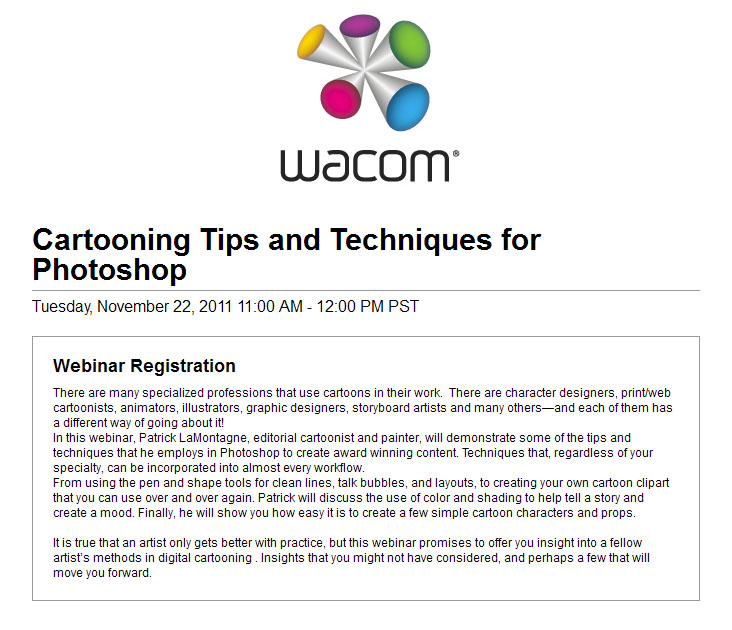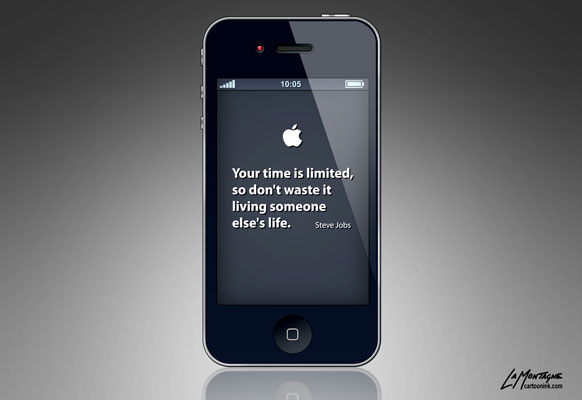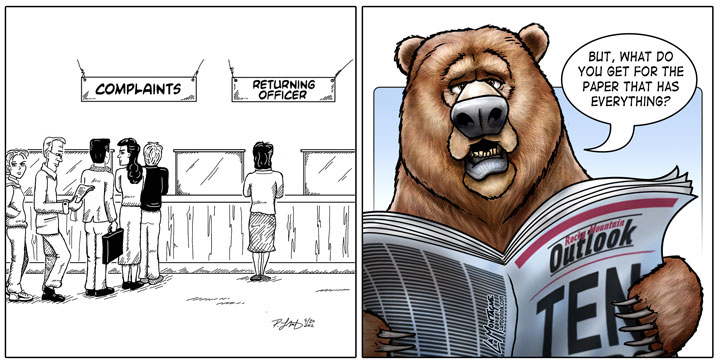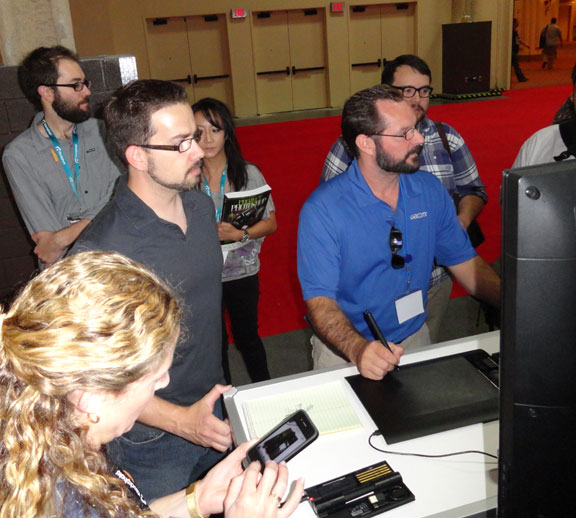Today is the day after the Alberta provincial election. To set the stage, there were four parties, the right-wing Progressive Conservatives who’ve been in power for 41 years, the Wildrose Party, a very new party even more right-wing than the PC Party, the Liberal Party and the Alberta New Democrat Party. The last two didn’t really stand a chance of winning, and all of the polls were indicating the the Wildrose Party could not only win, but might get a majority.
Alberta’s election was making headlines nationwide, because this province has huge deposits of natural resources which makes it a very wealthy province in that department. Many in Canada were watching this one closely. For example, a cartoon I did about Danielle Smith, the leader of the Wildrose Party, a couple of weeks ago was published in a number of my Ontario papers. I didn’t expect that.
Again, ALL of the pollsters were predicting that the Wildrose Party was going to take the election in a big way.
Without getting into the reasons why, the results last night had the PC Party win their 12th consecutive majority, taking 61 seats. The Wildrose Party got 17, making them the Official Opposition, the Liberals and the NDP each got 4 seats. It wasn’t even close and nobody saw it coming. There is an article in the Vancouver Sun this morning (obviously gone to press before the results were in) by Andrew Coyne that reads, “Unless something astonishing happens, the Wildrose Party will form the next government of Alberta.”
As a syndicated cartoonist, my job yesterday was to put out cartoons that would cover almost any reasonable outcome. Many of my papers publish weekly, and a number of them publish today. They needed to have a cartoon to put onto the editorial page at the last possible moment, right before going to press. No time to draw something once the results were in at 9:00 last night, so I had to anticipate different outcomes, knowing that most of these cartoons would end up in the trash. Considering this led to a 12 hour day at my desk plus a couple of hours on Saturday when I was taking a weekend off at the cabin, I worked for very little money yesterday.
It’s part and parcel of the profession, however, and while none of the cartoons addressed the sweeping majority, there were still a couple that would have been ‘good enough’ to do the job, even though I don’t consider them really ‘good.’ Let’s take a look at what I sent out yesterday.
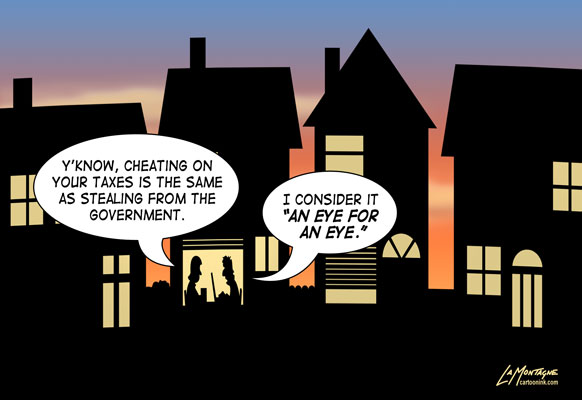 This cartoon has absolutely nothing to do with the election. Even though Canada was watching this one, many of my weeklies in other provinces were wanting a cartoon on something else. I knew this without their having to tell me, so this went out first to cover them.
This cartoon has absolutely nothing to do with the election. Even though Canada was watching this one, many of my weeklies in other provinces were wanting a cartoon on something else. I knew this without their having to tell me, so this went out first to cover them.
 There was some talk that there could be a minority government, and if that happened, there had to be a cartoon for it, because the others were all talking about who won. This cartoon went out second.
There was some talk that there could be a minority government, and if that happened, there had to be a cartoon for it, because the others were all talking about who won. This cartoon went out second.
 A lot of people were doing a lot of talking over the past month, and everybody sounded like they were sure of the outcome. Happens in every election. The day after, however, stories change and everybody boasts that they knew it all along. That’s about as predictable as politicians breaking election promises. This cartoon was pretty easy to swap out. Change the name and…
A lot of people were doing a lot of talking over the past month, and everybody sounded like they were sure of the outcome. Happens in every election. The day after, however, stories change and everybody boasts that they knew it all along. That’s about as predictable as politicians breaking election promises. This cartoon was pretty easy to swap out. Change the name and…
 …this is one of the cartoons that works. Premier Alison Redford is the leader of the Progressive Conservative Party and won her seat, so any of my papers could have put this one in and it would have been appropriate. Not a great cartoon, granted, but if I’m being honest, I was more concerned with it being right than great.
…this is one of the cartoons that works. Premier Alison Redford is the leader of the Progressive Conservative Party and won her seat, so any of my papers could have put this one in and it would have been appropriate. Not a great cartoon, granted, but if I’m being honest, I was more concerned with it being right than great.
 If the Wildrose Party had won, I would have liked to have seen the above cartoon printed in a number of papers. I kind of like it. Seemed an appropriate theme for our western province, especially if a Wildrose win upset 41 years of rule by the previous ‘brand.’ Unfortunately, this took me a couple of hours to paint and nitpick, and the results rendered it completely useless. That being said, I didn’t want to see the Wildrose Party win, so I’m fine.
If the Wildrose Party had won, I would have liked to have seen the above cartoon printed in a number of papers. I kind of like it. Seemed an appropriate theme for our western province, especially if a Wildrose win upset 41 years of rule by the previous ‘brand.’ Unfortunately, this took me a couple of hours to paint and nitpick, and the results rendered it completely useless. That being said, I didn’t want to see the Wildrose Party win, so I’m fine.
 This is the last cartoon I sent, just after 5:0o yesterday evening. Danielle Smith, the leader of the Wildrose Party had promised (there’s that word again) to give every Albertan a cheque for $300 from the Alberta Energy Dividend Fund once the province was boasting a surplus again. It was dubbed ‘Dani Dollars’ by the press and ended up being a significant part of the campaign, one met with mixed reviews. This cartoon works for today as well, although I’m not sure how many papers will actually use it.
This is the last cartoon I sent, just after 5:0o yesterday evening. Danielle Smith, the leader of the Wildrose Party had promised (there’s that word again) to give every Albertan a cheque for $300 from the Alberta Energy Dividend Fund once the province was boasting a surplus again. It was dubbed ‘Dani Dollars’ by the press and ended up being a significant part of the campaign, one met with mixed reviews. This cartoon works for today as well, although I’m not sure how many papers will actually use it.
As an Alberta citizen and voter, I was relieved with last night’s results. As an editorial cartoonist, I know I didn’t hit any home runs with the usable cartoons. More like base hits. But my papers were covered, so I did my job. I’ll still do a couple of post election toons this week, but none will be wasted as we now know the results.
It was an interesting election and I don’t say that often. Most importantly, voters were involved and I’ll be anxious to hear what the official turnout numbers were, because it’s expected to be significantly better than the dismal 40% from 4 years ago. That being said, I’m glad it’s over, as my illustration contracts and painting commissions have had to simmer on the back-burners this past month. I’m happy to get back to those this week.





